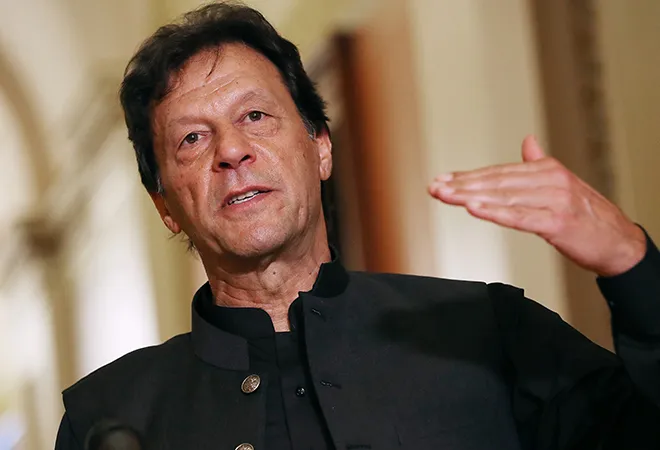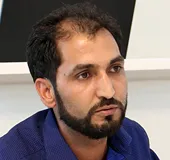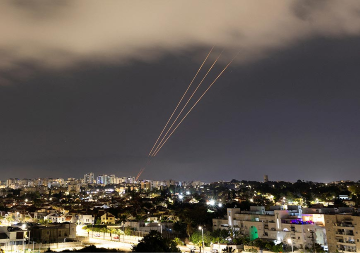Pakistani Prime Minister Imran Khan, in a high-level government meeting on 21 April, decided to allow congregational prayers at mosques during the holy month of Ramadan amid COVID-19 pandemic outbreak. The decision was taken under tremendous pressure from radical clerics, mullahs and persons from different politico-religious ideologies included in the proscribed AhleSunnat Wal Jamaat.
This pronouncement to allow congregational prayers came after mullahs served an open ultimatum on the government and wilfully violated the ban on the congregations at mosques across the country. Three cases were registered against Maulana Abdul Aziz of Lal Masjid for violating the ban on Friday congregations. A person related to Aziz was also booked for displaying arms. However, none has been arrested so far.
This pronouncement to allow congregational prayers came after mullahs served an open ultimatum on the government and wilfully violated the ban on the congregations at mosques across the country.
The decision to allow prayer congregations during Ramadan comes even as 27 percent (2,258) of the positive COVID-19 cases in the country were found to be related to a religious gathering in Raiwind, which had around 70,000 persons. It is indeed shocking that at a time when Saudi Arabia, Turkey, Iran and Kuwait have banned congregations for five daily prayers, as well as Friday prayers, Imran Khan meekly gave in to these radical mullahs, putting the lives of his countrymen in danger. In fact, Saudi Arabia has even suspended the special tarawih prayers for the Ramadan month at the Grand Mosque (Masjid al-Haram) and the Prophet’s Mosque (Masjid al-Nabawi) to curb the spread of coronavirus.
Religious endorsement
The coronavirus has forced almost all countries to enforce severe lockdowns, strict social distancing and other harsh measures to contain the spread of the pandemic. Most other Muslim countries, including Pakistan, also introduced lockdowns to ensure social isolation, the remedy to stop the rampant spread of the virus.
The government also issued lockdown orders and imposed restrictions on daily as well as Friday prayers. As per the lockdown order, all four provinces and the capital administration limited the number of people to five in mosques to curb the spread of the pandemic. The curbs on the gathering of worshippers were endorsed by the country’s highest religious committee, namely, the Council of Islamic Ideology (CII), on 2 April.
Out of the four provinces, only Punjab and Sindh implemented the lockdown and suspended Friday congregations. The order was flouted in Karachi and most other major towns.
The CII, in a press release, even advised the government to seek the cooperation of the local mullahs so that “they become a part of the government campaign to prevent the coronavirus by adopting safety precautions.” Furthermore, some of the religious organisations like Darul Afta Pakistan, Pakistan Ulema Council (PUC) and the leadership of Wafaq-ul-Masajid, Madaris-e-Pakistan also endorsed the government orders in accordance with the Shariat and Sahih Bukhari (saying of the last Prophet).
Despite such support, government agencies failed to implement the order. Out of the four provinces, only Punjab and Sindh implemented the lockdown and suspended Friday congregations. The order was flouted in Karachi and most other major towns. In Sindh, 88 cases were registered and 38 prayer leaders were arrested for violating the orders. However, all the charges were subsequently dropped and the mullahs were released under the directions Chief Minister Murad Ali Shah.
Lal Masjid and lockdown
Islamabad’s Lal Masjid, known for its anti-government ideologies, has for years become a hub of radical mullahs. In 2007, the mullahs, with the help of gun-wielding men, abducted Chinese girls who ran a beauty parlour. As the news of the abduction spread, China forced Pakistan to act against the seminary at Lal Masjid. The government responded by launching military ‘Operation Sunrise’, in which the masjid’s deputy Imam Abdul Rashid Ghazi was killed.
The military action against Lal Masjid also became the rallying cry of Imran Khan-led TTP, then in the opposition, to fight the establishment.
The Lal Masjid episode inspired several terror groups to wage global jihad. Within six months of the ‘Operation Sunrise’, more than 40 terror leaders — who held sway over 40,000 militants — gathered in Waziristan on 14 December 2007 and they formed a united front — Tehrik-I-Taliban Pakistan (TTP) — vowing to avenge the killing of Ghazi.
The military action against Lal Masjid also became the rallying cry of Imran Khan-led TTP, then in the opposition, to fight the establishment. The resulting acts of terror resulted in the death of 1,188 persons and injuries to 3,209 in 88 bombings in just one year after the Lal Masjid siege. After the ‘Operation Sunrise’, the government has repeatedly tried to control the affairs of the shrine, but failed miserably.
COVID-19 has once again exposed the widening rift between the radical religious organisations like the one in Lal Masjid and their parochial leaders and the government. Maulana Abdul Aziz has blatantly defied government directives and deployed armed men outside the complex to ensure that the prayer congregations — held despite the ban — were conducted without any disruption.
When pointed out that even Saudi Arabia has cancelled large gatherings at the two of the most revered Islamic shrines, Imran Khan said that Pakistan was an “independent nation” and had the freedom to decide in the best interests of its citizens.
Similarly, 53 other senior radical mullahs from Rawalpindi and Islamabad representing different politico-religious ideologies, including the proscribed AhleSunnat Wal Jamaat, warned the authorities against the restrictions on the congregations in mosques. They said the lockdown is not applicable to mosques and congregation prayers.
‘Independent nation’ theory
As the decision to roll back the ban on prayer congregations came under criticism, Imran Khan came up with a rather naïve justification for the same. The Prime Minister said the congregations will be organised under the strict standard operating procedures (SOPs), framed by the government in consultation with the mullahs. He warned of strict action if the SOPs were not followed. When pointed out that even Saudi Arabia has cancelled large gatherings at the two of the most revered Islamic shrines, Imran Khan said that Pakistan was an “independent nation” and had the freedom to decide in the best interests of its citizens.
The dangerous decision to allow mass prayer congregations has once again exposed the government’s weakness against the might of the radical religious forces. By giving in to pressure from terror masters like Abdul Aziz, who don the mask of a mullah, Imran Khan has also exposed the real intentions behind the recent removal of 4,000 terrorists from its watch list without any public explanation.
This commentary originally appeared in South Asia Weekly.
The views expressed above belong to the author(s). ORF research and analyses now available on Telegram! Click here to access our curated content — blogs, longforms and interviews.




 PREV
PREV


